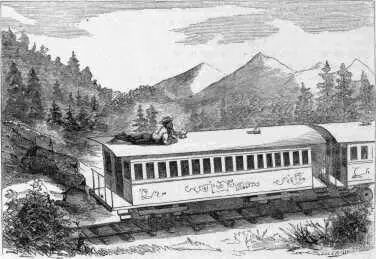William Still - The Underground Railroad (Complete Collection)
Здесь есть возможность читать онлайн «William Still - The Underground Railroad (Complete Collection)» — ознакомительный отрывок электронной книги совершенно бесплатно, а после прочтения отрывка купить полную версию. В некоторых случаях можно слушать аудио, скачать через торрент в формате fb2 и присутствует краткое содержание. Жанр: unrecognised, на английском языке. Описание произведения, (предисловие) а так же отзывы посетителей доступны на портале библиотеки ЛибКат.
- Название:The Underground Railroad (Complete Collection)
- Автор:
- Жанр:
- Год:неизвестен
- ISBN:нет данных
- Рейтинг книги:4 / 5. Голосов: 1
-
Избранное:Добавить в избранное
- Отзывы:
-
Ваша оценка:
- 80
- 1
- 2
- 3
- 4
- 5
The Underground Railroad (Complete Collection): краткое содержание, описание и аннотация
Предлагаем к чтению аннотацию, описание, краткое содержание или предисловие (зависит от того, что написал сам автор книги «The Underground Railroad (Complete Collection)»). Если вы не нашли необходимую информацию о книге — напишите в комментариях, мы постараемся отыскать её.
"The Underground Railroad" chronicles the stories and methods of some 649 slaves who escaped to freedom via the Underground Railroad. Author, William Still included his carefully compiled and detailed documentation about those that he had helped escape into the pages of The Underground Railroad Records.
William Still (1821-1902) was an African-American abolitionist in Philadelphia, conductor on the Underground Railroad, businessman, writer, historian and civil rights activist.
The Underground Railroad (Complete Collection) — читать онлайн ознакомительный отрывок
Ниже представлен текст книги, разбитый по страницам. Система сохранения места последней прочитанной страницы, позволяет с удобством читать онлайн бесплатно книгу «The Underground Railroad (Complete Collection)», без необходимости каждый раз заново искать на чём Вы остановились. Поставьте закладку, и сможете в любой момент перейти на страницу, на которой закончили чтение.
Интервал:
Закладка:
(LONDON, December 21st, 1860.)

JEREMIAH COLBURN. — Jeremiah is a bright mulatto, of prepossessing appearance, reads and writes, and is quite intelligent. He fled from Charleston, where he had been owned by Mrs. E. Williamson, an old lady about seventy-five, a member of the Episcopal Church, and opposed to Freedom. As far as he was concerned, however, he said, she had treated him well; but, knowing that the old lady would not be long here, he judged it was best to look out in time. Consequently, he availed himself of an Underground Rail Road ticket, and bade adieu to that hot-bed of secession, South Carolina. Indeed, he was fair enough to pass for white, and actually came the entire journey from Charleston to this city under the garb of a white gentleman. With regard to gentlemanly bearing, however, he was all right in this particular. Nevertheless, as he had been a slave all his days, he found that it required no small amount of nerve to succeed in running the gauntlet with slave-holders and slave-catchers for so long a journey.
The following pointed epistle, from Jeremiah Colburn alias William Cooper, beautifully illustrates the effects of Freedom on many a passenger who received hospitalities at the Philadelphia depot —
SYRACUSE, June 9th, 1858.
MR. STILL: — Dear Sir : — One of your Underground R.R. Passenger Drop you these few Lines to let you see that he have not forgoten you one who have Done so much for him well sir I am still in Syracuse, well in regard to what I am Doing for a Living I no you would like to hear, I am in the Painting Business, and have as much at that as I can do, and enough to Last me all the Summer, I had a knolledge of Painting Before I Left the South, the Hotell where I was working Last winter the Proprietor fail & shot up in the Spring and I Loose evry thing that I was working for all Last winter. I have Ritten a Letter to my Friend P. Christianson some time a goo & have never Received an Answer, I hope this wont Be the case with this one, I have an idea sir, next winter iff I can this summer make Enough to Pay Expenses, to goo to that school at McGrowville & spend my winter their. I am going sir to try to Prepair myself for a Lectuer, I am going sir By the Help of god to try and Do something for the Caus to help my Poor Breathern that are suffering under the yoke. Do give my Respect to Mrs Stills & Perticular to Miss Julia Kelly, I supose she is still with you yet, I am in great hast you must excuse my short letter. I hope these few Lines may fine you as they Leave me quite well. It will afford me much Pleasure to hear from you.
yours Truly,
WILLIAM COOPER.
John Thompson is still here and Doing well.
It will be seen that this young Charlestonian had rather exalted notions in his head. He was contemplating going to McGrawville College, for the purpose of preparing himself for the lecturing field. Was it not rather strange that he did not want to return to his "kind-hearted old mistress?"
THOMAS HENRY, NATHAN COLLINS AND HIS WIFE MARY ELLEN. — Thomas is about twenty-six, quite dark, rather of a raw-boned make, indicating that times with him had been other than smooth. A certain Josiah Wilson owned Thomas. He was a cross, rugged man, allowing not half enough to eat, and worked his slaves late and early. Especially within the last two or three months previous to the escape, he had been intensely savage, in consequence of having lost, not long before, two of his servants. Ever since that misfortune, he had frequently talked of "putting the rest in his pocket." This distressing threat made the rest love him none the more; but, to make assurances doubly sure, after giving them their supper every evening, which consisted of delicious "skimmed milk, corn cake and a herring each," he would very carefully send them up in the loft over the kitchen, and there "lock them up," to remain until called the next morning at three or four o'clock to go to work again. Destitute of money, clothing, and a knowledge of the way, situated as they were they concluded to make an effort for Canada.
NATHAN was also a fellow-servant with Thomas, and of course owned by Wilson. Nathan's wife, however, was owned by Wilson's son, Abram. Nathan was about twenty-five years of age, not very dark. He had a remarkably large head on his shoulders and was the picture of determination, and apparently was exactly the kind of a subject that might be desirable in the British possessions, in the forest or on the farm.
His wife, Mary Ellen, is a brown-skinned, country-looking young woman, about twenty years of age. In escaping, they had to break jail, in the dead of night, while all were asleep in the big house; and thus they succeeded. What Mr. Wilson did, said or thought about these "shiftless" creatures we are not prepared to say; we may, notwithstanding, reasonably infer that the Underground has come in for a liberal share of his indignation and wrath. The above travelers came from near New Market, Md. The few rags they were clad in were not really worth the price that a woman would ask for washing them, yet they brought with them about all they had. Thus they had to be newly rigged at the expense of the Vigilance Committee.
The Cambridge Democrat , of Nov. 4, 1857, from which the advertisements were cut, said —
"At a meeting of the people of this county, held in Cambridge, on the 2d of November, to take into consideration the better protection of the interests of the slave-owners; among other things that were done, it was resolved to enforce the various acts of Assembly * * * * relating to servants and slaves.
"The act of 1715, chap. 44, sec. 2, provides 'that from and after the publication thereof no servant or servants whatsoever, within this province, whether by indenture or by the custom of the counties, or hired for wages shall travel by land or water ten miles from the house of his, her or their master, mistress or dame, without a note under their hands, or under the hands of his, her or their overseer, if any be, under the penalty of being taken for a runaway, and to suffer such penalties as hereafter provided against runaways.' The Act of 1806, chap. 81, sec. 5, provides, 'That any person taking up such runaway, shall have and receive $6,' to be paid by the master or owner. It was also determined to have put in force the act of 1825, chap. 161, and the act of 1839, chap. 320, relative to idle, vagabond, free negroes, providing for their sale or banishment from the State. All persons interested, are hereby notified that the aforesaid laws, in particular, will be enforced, and all officers failing to enforce them will be presented to the Grand Jury, and those who desire to avoid the penalties of the aforesaid statutes are requested to conform to these provisions."
As to the modus operandi by which so many men, women and children were delivered and safely forwarded to Canada, despite slave-hunters and the fugitive slave law, the subjoined letters, from different agents and depots, will throw important light on the question.
Men and women aided in this cause who were influenced by no oath of secresy, who received not a farthing for their labors, who believed that God had put it into the hearts of all mankind to love liberty, and had commanded men to "feel for those in bonds as bound with them," "to break every yoke and let the oppressed go free." But here are the letters, bearing at least on some of the travelers:
WILMINGTON, 10th Mo. 31st, 1857.
ESTEEMED FRIEND WILLIAM STILL: — I write to inform thee that we have either 17 or 27, I am not certain which, of that large Gang of God's poor, and I hope they are safe. The man who has them in charge informed me there were 27 safe and one boy lost during last night, about 14 years of age, without shoes; we have felt some anxiety about him, for fear he may be taken up and betray the rest. I have since been informed there are but 17 so that I cannot at present tell which is correct. I have several looking out for the lad; they will be kept from Phila. for the present. My principal object in writing thee at this time is to inform thee of what one of our constables told me this morning; he told me that a colored man in Phila. who professed to be a great friend of the colored people was a traitor; that he had been written to by an Abolitionist in Baltimore, to keep a look out for those slaves that left Cambridge this night week, told him they would be likely to pass through Wilmington on 6th day or 7th day night, and the colored man in Phila. had written to the master of part of them telling him the above, and the master arrived here yesterday in consequence of the information, and told one of our constables the above; the man told the name of the Baltimore writer, which he had forgotten, but declined telling the name of the colored man in Phila. I hope you will be able to find out who he is, and should I be able to learn the name of the Baltimore friend, I will put him on his Guard, respecting his Phila. correspondents. As ever thy friend, and the friend of Humanity, without regard to color or clime.
Читать дальшеИнтервал:
Закладка:
Похожие книги на «The Underground Railroad (Complete Collection)»
Представляем Вашему вниманию похожие книги на «The Underground Railroad (Complete Collection)» списком для выбора. Мы отобрали схожую по названию и смыслу литературу в надежде предоставить читателям больше вариантов отыскать новые, интересные, ещё непрочитанные произведения.
Обсуждение, отзывы о книге «The Underground Railroad (Complete Collection)» и просто собственные мнения читателей. Оставьте ваши комментарии, напишите, что Вы думаете о произведении, его смысле или главных героях. Укажите что конкретно понравилось, а что нет, и почему Вы так считаете.












